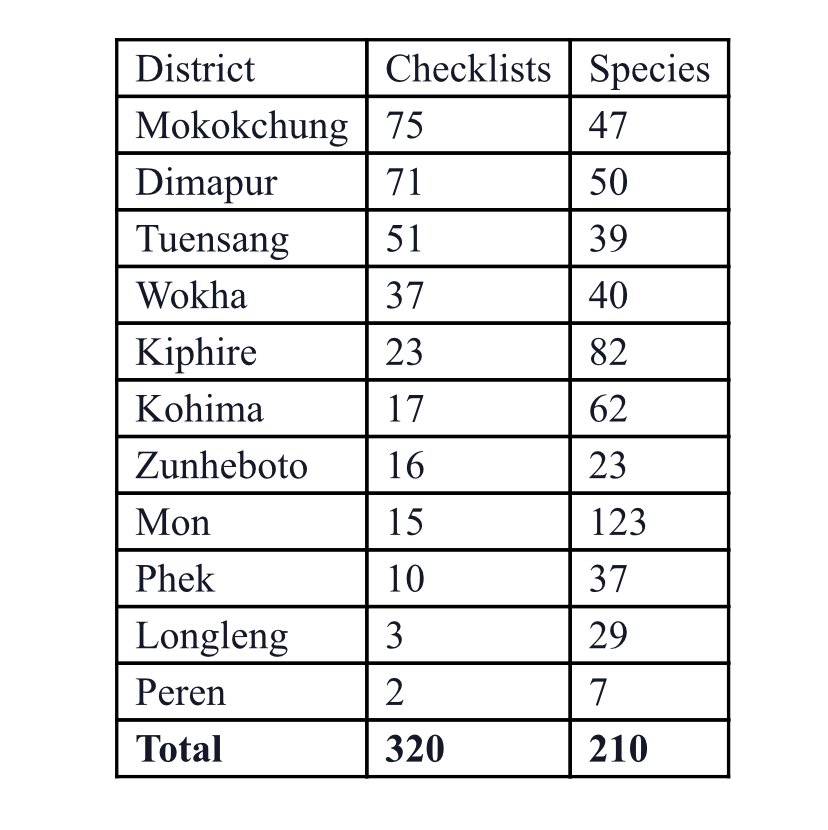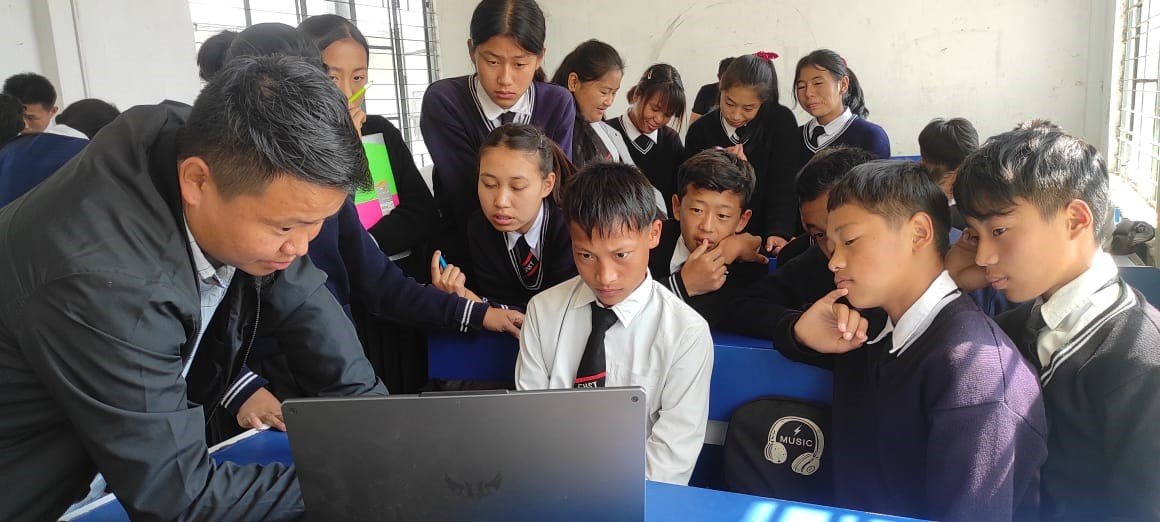The second edition of the Tokhü Emong Bird Count (TEBC), held from 4th to 7th November 2023, brought in double the participation from the 2022 edition with 47 birders across Nagaland reporting 210 species in 320 checklists, the organisers of the event informed. On the last day, 19 birders contributed 74 checklists across seven Territorial Forest Divisions – counting over 80 species.
Flagged off on 4th November, in synchrony with Tokhü Emong Festival – a time for celebration, fellowship, and reconciliation – TEBC 2023 helped reconnect communities with birds around them and foster renewed understanding.
Download Nagaland Tribune app on Google Play

The organisers stated that this year, TEBC was undertaken in the jurisdictions of all 11 territorial Forest Divisions in Nagaland. Eco Warriors Nagaland identified a nodal person from every district and deployed field teams. Through the Directorate of School Education, Government of Nagaland, 14 government schools took part in their respective districts, namely, Government Primary School Fakim, Government Middle School Pungro Town, GMS Okotso, Government High School Tizit, Government School Satakha, GMS Sangphur B, GMS Jalukie, GHS Khenyu, GMS Sanglao, GHS Zhadima, GHSS Singrijan, GMS Tuensang, and GMS Sector-A Wokha. Bethesda School Okotso, Baptist Thangyen Hr. Sec. School, Unity Christian Hr. Sec. school Chümoukedima, R.C. Chiten Memorial Government High School Changtongya Town, Loyola Hr. Sec. School Kiphire and St. Xavier’s College Jalukie also participated in the event.

Students from Government High School, Tizit in Mon district, Nagaland spotting birds (PC: TEBC)
Manash Pratim covered the Mon district in north-eastern Nagaland contributing 14 eBird checklists and 118 species.
Lansothung Lotha led a three-member team that covered Tuensang, Mokokchung, Zunheboto, and Wokha districts over a four-day long excursion, meeting school children, local youths, and front-line forest staff and contributing 52 checklists with 90 species. The team contributed the first eBird checklists ever for the Tuensang district – one of the only two districts in the entire country that did not have a single checklist in the eBird database. Now, the eBird database notes 39 avian species from Tuensang district.
After TEBC 2023, the Nagaland state database records 282 species in Kohima district, and 97 in Longleng district. Surely, there are many more to be added as more community members become enthusiastic about bird watching and observing avian interactions in this biodiversity hotspot.

This year, scientists from Wildlife Institute of India (WII) contributed checklists from Longleng while scientists from Wildlife Trust of India (WTI) and WWF-India contributed observations from Kohima district in addition to local participants. The team from Foundation of Ecological Security (FES) covered the districts of Wokha, Phek, and Dimapur.
Thanamir Researchers’ Team covered Kiphire district contributing 17 checklists with a total of 82 species.

Green-tailed Sunbird (PC: Aprit Bansal)
Several teams reported flocks of Amur Falcons flying over the skies. Blyth’s Tragopan, the state bird, was recorded in Kohima district. Naga Wren Babbler, endemic to the Naga hills, was reported in Kohima and Zunheboto districts. The State of India’s Birds 2023 report compiled by 13 partner organisations records four ‘Highest Priority Species’ for Nagaland: Blyth’s Tragopan, Naga Wren Babbler, Dark-rumped Swift, and Chestnut-backed Laughingthrush. In addition to the above mentioned species, Manipur Fulvetta is added to the list of ‘Species of Highest Conservation Priority’ for the state. There are even more sparrows in Nagaland than meet the eye, namely the Eurasian Tree Sparrow and Russet Sparrow.
“Significant gaps remain in our current understanding of avian population and their habitats in Nagaland. However, community participation can play a significant role in strengthening our database through events like the TEBC. By continuing to document information on our birds over the years through citizen-science platform like eBird, we are optimistic in addressing existing knowledge gaps and thereby help in making well-informed conservation decisions, while also garnering birding as a hobby among the general public,” said Lansothung Lotha, Range Forest Officer, Nagaland Forest Department.
“Our biggest challenge during TEBC was to distribute a sufficient number of binoculars to our participants. Binoculars provide a big difference in bird-watching experience. We hope that more sponsors will come forward in the future to supply binoculars to help our budding birdwatching community,” said Chenibemo Odyuo, Team Leader, Nagaland Forest Management Project, Foundation for Ecological Security, Phek, Nagaland.

Amur Falcon (PC: Albin Jacob)
“We have seen a remarkable increase in the birding community’s engagement this year, with the second edition of TEBC expanding from a small initiative originating in 2022 from Wokha district to encompassing the entirety of Nagaland in 2023. The rich diversity of our avian wealth is becoming increasingly evident, and this year’s bird count has been pivotal in bringing this to the forefront,” stated Suman W M Sivachar IFS, DFO Wokha Forest Division and Doyang Plantation Division.
“I really appreciate efforts like TEBC that attempts to document the rich avian diversity of Nagaland. Challenges are many, but volunteers did a marvelous job in enriching the open-source database which will help prevent biodiversity loss and restore ecosystems,” commented Shri Vedpal Singh, IFS, Principal Chief Conservator of Forests & Chief Wildlife Warden, Nagaland, on the TEBC 2023.
“TEBC is a way to reflect on our relationships with nature and sustainability. It calls for an effective stewardship of the natural wealth that Nagaland has been endowed with. Collectively, we can work better towards conservation and biodiversity resource management. I strongly encourage the younger generation to venture out on nature’s trails and learn more about the avian diversity in our State.” said Dharmendra Prakash, IFS, Principal Chief Conservator of Forests & Head of Forest Force, Government of Nagaland.

Students from Baptist Thangyen Higher Secondary School, Tuensang, learning to identify birds (PC: TEBC)
“TEBC and the activities undertaken by the students and communities underline the essence of engaged research and scholarship. This initiative highlighted how we can work towards a collective experience of developing Indigenous pedagogy, and co-create knowledge between researchers, students, activists, government bodies, and community members. The food sovereignty team remains devoted and carry forth such community engagements and look forward to celebrating many such initiatives to center community knowledge.” Said Dr. Dolly Kikon, Anthropologist, University of Melbourne & researcher for the Food Sovereignty project.
TEBC as a platform for citizen science brings together interested and skilled volunteers unveiling the current diversity of life, its history, and vulnerability. Indigenous worldview, oral histories, myths, and legends can be significant in reworking celebration, fellowship, reconciliation, and stewardship.
Besides engaging in birding sessions, TEBC participants were also involved in various training programmes in all the districts of Nagaland to over 350 students, frontline forest staff and general public. TEBC 2023 was organised in collaboration with the Wokha Forest Division and the Divisional Management Unit, Nagaland Forest Management Project (NFMP), Wokha district, and Bird Count India. Partners joining the TEBC 2023 are the Department of School Education Nagaland, Foundation for Ecological Security (FES), and Eco Warriors Nagaland. The event is powered by eBird India. This year, the Practicing Food Sovereignty research team from the University of Melbourne, Stockholm University, and North Eastern Social Research Centre also joined as research partners.
With this, the TEBC 2023 campaign that was earlier launched by the Union Minister of Environment, Forests, & Climate Change, and Labour & Employment, Bhupender Yadav, in August 2023, ended on a high note.

